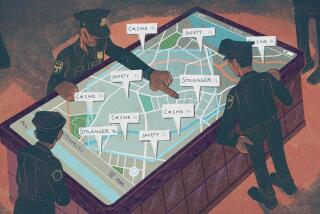The Cellular Soap Opera : Mobile Phone Calls Aren’t as Private as Some Believe
You’ve finally joined that elite group of men and women who do business out of their cars via cellular telephone, the latest high-priced advance in mobile conversation.
Here you are, stuck in rush-hour freeway traffic, calling your spouse to say you’ll be late for dinner, and then calling the office to check on activities there. Perhaps you exchange a little sweet talk or business gossip with your secretary.
For the record:
12:00 a.m. Feb. 27, 1986 For the Record
Los Angeles Times Thursday February 27, 1986 Home Edition Part 1 Page 2 Column 1 Metro Desk 2 inches; 55 words Type of Material: Correction
A story in the Feb. 21 editions of The Times about concerns over the privacy of mobile cellular telephones described calls that were intercepted by a Monrovia man using a radio scanner. While some scanners can randomly intercept high-frequency cellular telephone calls, the intercepted calls in the story were made from conventional radio telephone car phones, not from cellular models.
A few words of advice: Be careful. Someone may be listening.
Cellular phones may look and feel like private phones, but their conversations are beamed over the same kind of radio waves that carry police and fire communications. Hence anybody with an ordinary radio scanning device may stumble onto your most intimate business or personal chats.
Companies that sell and broadcast the signals of cellular telephones insist that such interceptions are highly unlikely because of the technology used in the complex process. Ask a typical salesman if there is any such risk and he’ll probably shake his head and answer, “This is a private line.”
All of which brings a soft smile from John Hennesey.
Hennesey, 76, is a retired medical instrument company purchasing agent who lives in a small apartment in Monrovia and amuses himself by scanning radio channels that are reserved for cellular telephone transmissions.
“It’s like a soap opera without pictures,” he said.
Personal Calls
Sitting at his kitchen table on a recent afternoon, Hennesey scanned a dozen or so cellular channels and encountered a typically mundane collection of business calls--salesmen keeping track of fuel costs, businessmen revising their slide projection displays, doctors confirming surgery appointments.
But with surprising regularity he also came across fragments of personal telephone calls in which it was obvious that neither party had any idea that someone might be listening. There was none of the sense of audience that often permeates chatter on citizens band radio channels.
Instead, there was the salesman comforting the receptionist as she bemoaned her divorce. (“He gets extremely erratic,” she said of her husband. “There are times he can cut through you like a knife.”)
There was the pending cocaine deal. (“Bring it half rock, half powder,” one of the parties advised the other.)
There were downright sleazy admissions. (“This is a lady I used to fool around with and her husband,” said one salesman, outlining two prospective clients. “Her husband likes me now, too.”)
And there was everyday celebration. (“The bris was wonderful,” said a woman, describing the Jewish circumcision ritual. “Everyone had a wonderful time--except for the baby. It must hurt.”)
Not exactly “Dynasty,” but for a man with health problems who lost his wife of 54 years last June and whose immediate family lives in Dallas, it breaks up the day.
“Hell’s bells,” Hennesey exclaimed pleasantly. “It’s more interesting than police and fire calls. I really feel like I’m invading someone’s privacy. But it’s fun.”
It was only by accident, after his grandson sent him the scanner last Christmas, that Hennesey stumbled upon one channel reserved for cellular phones. Last week, the grandson, Marion Reily, an admitted gadget nut, visited Hennesey and programmed the scanner to jump from one cellular channel to another.
By now, Hennesey said, he is recognizing voices.
“I had one guy, he called his girlfriend every night about 4:30. Oh, he was foul-mouthed. She was, too. He went on telling her how much he loved her and she told him she was pregnant. I followed them clear through the abortion.”
New on the Market
Cellular phones, whose calls are routed through a network of transmission stations that each serve a radius of less than 10 miles, were developed about 15 years ago by Bell Laboratories but have been available to consumers for only about two years.
While the phones cost about $2,000 and involve average monthly bills of about $150, they have become enormously popular in Southern California, which now has nearly 50,000 cellular phone subscribers, about 25% of the nation’s total.
Despite the surge, there have been few complaints about interceptions. However, that may be because many subscribers, and the people they call, do not realize that cellular phones are not completely secure, according to Paul Fadelli, consultant to the state Senate Energy and Public Utilities Committee.
The committee’s chairman, Herschel Rosenthal (D-Los Angeles), last year authored a bill that was signed into law making it a crime to “maliciously” intercept cellular telephone calls--for example, to monitor them in an attempt to steal business secrets.
The law also prohibits devices manufactured solely to monitor cellular phone calls. Fadelli said during hearings on the bill that it was learned that a company in the Midwest was advertising such a device (and ironically using an advertising slogan much like Hennesey’s description: “It’s better than a soap opera”).
Beeping Signal
Rosenthal recently introduced another bill that would require the state Public Utilities Commission to determine whether cellular phone transmission systems should be required to add an introductory beeping noise to each call so the person who receives a call from a cellular phone will know “it comes from a different kind of network that might not be as private,” Fadelli said.
Cellular phone users can take comfort in knowing that it is extremely difficult for their conversations to be picked up in anything more than a random way.
PacTel Mobile Access, which runs the lone operating cellular network in Los Angeles and Orange counties, has 32 transmission towers beaming phone signals. Each tower handles cellular phone signals from a relatively small geographic area. If someone is talking while driving, he will pass from one transmission radius to another within a matter of a few miles, and his call will be automatically switched from one channel to another, said Reed Royalty, a spokesman for the firm.
PacTel Mobile Access, a subsidiary of Pacific Telesis, has contracted with a number of phone sales companies to act as sales agents, and these agents are instructed to caution buyers that “anytime you broadcast over the airwaves there is always the possibility that somebody would intercept the conversation,” Royalty said.
Unaffiliated Firms
However, many unaffiliated companies also market cellular telephones, and a Times survey of half a dozen of them found few salespeople willing to readily admit that interception of calls is possible. Usually, a reporter posing as a customer had to ask the question several times before the seller would admit that interception of signals was possible.
Hennesey said he prefers eavesdropping on business conversations rather than personal calls and is put off by “the use of profanity. It’s much more extensive that I thought it was. Sometimes more than half the conversation is profanity.”
He said he won’t bemoan the loss of amusement if cellular phone users become more circumspect.
“No, I think it’s best in the business world if people are more careful,” he said. “There isn’t as much dignity as there used to be.”






